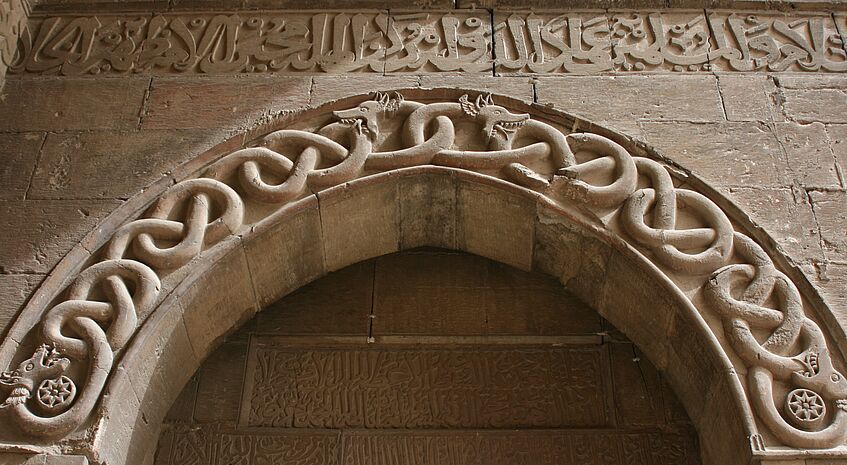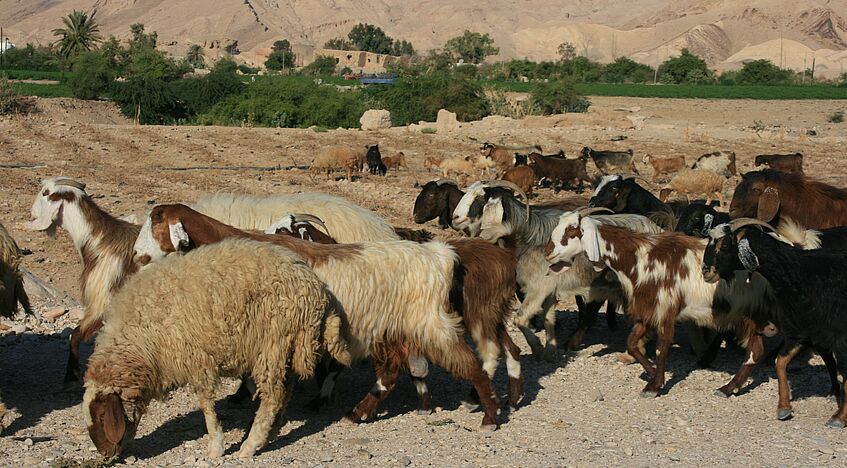History of Arabic research at the Department of Near Eastern Studies
The founding member of the "Orientalisches Institut" in Arabic Studies was Joseph von Karabacek (1845-1918), who was mainly concerned with Islamic art history, numismatics and palaeography. Karabacek played a vital role in the purchase of Arabic, Greek and Coptic papyri for the collection of Archduke Rainer (today the papyrus collection of the Austrian National Library). Thus, the long tradition of Arabic papyrology in Vienna also goes back to him. With the sifting and partial edition of 4,000 Arabic papyri, he was one of the pioneers in this field worldwide. His student Adolf Grohmann (1887-1977) continued this tradition, but went to the University of Prague in 1923 as professor and after World War II to Cairo.
A practice-oriented philologist was Adolf Wahrmund (1827-1913), who taught Arabic as a lecturer for many decades and is still a well-known name in the field thanks to his “Arabic-German Dictionary”, which was extremely modern by contemporary standards. However, Wahrmund was also a leading proponent of "scientific anti-Semitism", whose works even influenced Adolf Hitler and have remained well known in anti-Semitic circles to the present day.
David Heinrich von Müller (1846-1913) had been Professor of Semitic Studies since the founding of the Institute in 1886. Among other things, he dealt with Arab historians (especially aṭ-Ṭabarī), but his main interest soon turned to Yemen. As one of the leaders of the South Arabian Expedition of 1888/89, he was instrumental in the development of Austrian South Arab Studies, which were continued after World War I (particularly at the University of Graz) and enjoyed worldwide recognition. It is thanks to the initiative of Dr. Roswitha Stiegner (Graz) that the field of South Arabian Studies was revived in 2008 and today represents one of the focal points of Arabic Studies at the Department.

Entrance to the citadel of Aleppo, Syria @ Stephan Procházka
Müller's student and successor Rudolf Geyer (1861-1929) made a name for himself primarily through his editions and research on ancient Arabic poetry. He supported the habilitation of Viktor Christian (1885-1963) who became full professor of "Old Semitic Philology and Oriental Archaeology" in 1930. During the Nazi era, Christian played a major role in anti-Semitic research and was even Rector of the University of Vienna at the end of the war. Many Arabists and Semitists who later became internationally famous were expelled from the Department in the 1930s because of the anti-Semitic attitudes of many professors. Among them were the well-known historian Gustav von Grunebaum (UCLA, Los Angeles), the world-renowned expert on Middle Arabic, Joshua Blau (Hebrew University, Jerusalem), as well as Wolf Leslau (UCLA, Los Angeles), perhaps the most famous Semitist of the 20th century.
During the war years, the convinced National Socialist Hans Kofler (1896-1947) was Professor of Arabic and Islamic Studies. Among other things, he dealt with Ibn ˁArabī, but he also wrote a number of articles on ancient Arabic dialects.
Shortly after World War II, Hans Ludwig Gottschalk (1904-1981) was appointed Professor of Arabic and Islamic Studies. He was mainly interested in medieval history and published influential studies on the Ayyubid and Mamluk periods. He was followed in 1974 by Arne A. Ambros (1942-2007), who clearly orientated Arabic Studies in the direction of linguistics. Ambros was the author of the most widely printed German textbook on the Modern Written Arabic for decades, published several studies on Arabic dialectology, and in later years became well-known as one of the leading experts on the language of the Koran. As a graduate physicist, Ambros also made use of statistical methods and, as early as the 1980s, introduced computer-aided approaches to his research. Herbert Eisenstein worked at the Department as an assistant and later as an associated professor from 1975-2011. In addition to his work on Classical Arabic, his research interest was primarily focused on Arabic zoography.

Herd of sheep and goats in Wadi Araba, Jordan @ Stephan Procházka
Sources:
Österreichisches Biographisches Lexikon (ÖAW)
Diverse Nachrufe in der Wiener Zeitschrift für die Kunde des Morgenlandes
Wolfieter Bihl: Orientalistik an der Universität Wien. Wien: Böhlau 2009.
Utz Maas: Verfolgung und Auswanderung deutschsprachiger Sprachforscher 1933-1945. Tübingen: Stauffenburg-Narr, 2010.
